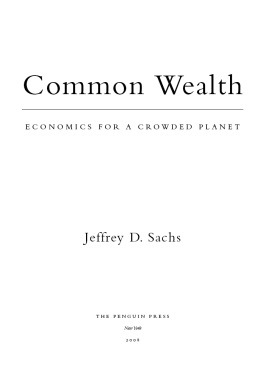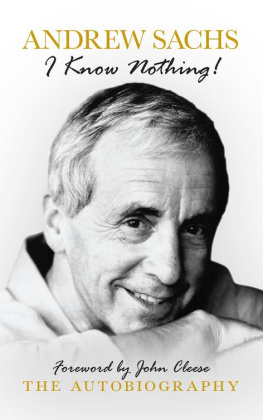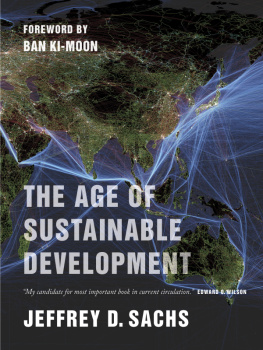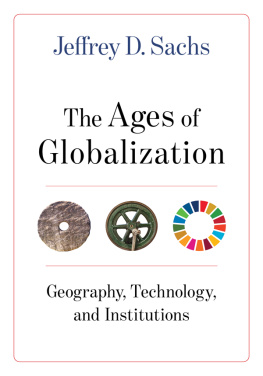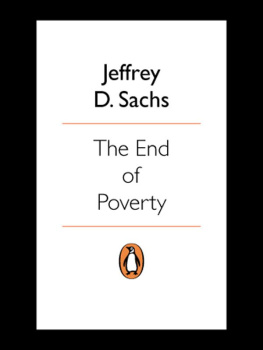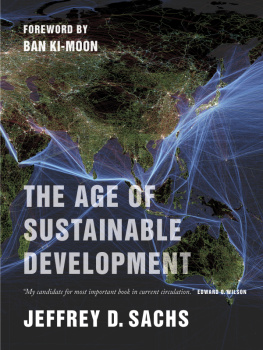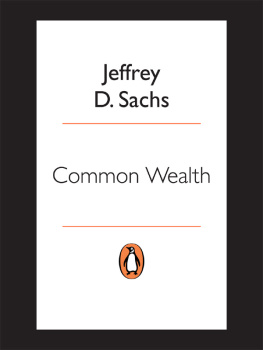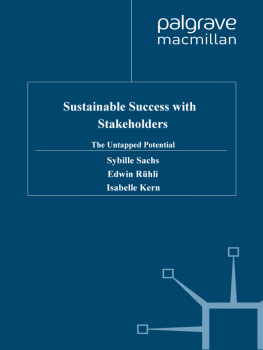A LSO BY J EFFREY D. S ACHS
Common Wealth
ECONOMICS FOR A CROWDED PLANET
Jeffrey D. Sachs
THE PENGUIN PRESS
New York
2008
THE PENGUIN PRESS
Published by the Penguin Group
Penguin Group (USA) Inc., 375 Hudson Street, New York New York 10014, U.S.A. Penguin Group (Canada), 90 Eglinton Avenue East, Suite 700, Toronto, Ontario, Canada M4P 2Y3 (a division of Pearson Penguin Canada Inc.) Penguin Books Ltd, 80 Strand, London WC2R oRL, England Penguin Ireland, 25 St. Stephens Green, Dublin 2, Ireland (a division of Penguin Books Ltd) Penguin Books Australia Ltd, 250 Camberwell Road, Camberwell, Victoria 3124, Australia (a division of Pearson Australia Group Pty Ltd) Penguin Books India Pvt Ltd, 11 Community Centre, Panchsheel Park, New Delhi110 017, India Penguin Group (NZ), 67 Apollo Drive, Rosedale, North Shore 0632, New Zealand (a division of Pearson New Zealand Ltd) Penguin Books (South Africa) (Pty) Ltd, 24 Sturdee Avenue, Rosebank, Johannesburg 2196, South Africa
Penguin Books Ltd, Registered Offices: 80 Strand, London WC2R oRL, England
First published in 2008 by The Penguin Press,
a member of Penguin Group (USA) Inc.
Copyright Jefrey D. Sachs, 2008
All rights reserved
Library of Congress Cataloging-in-Publication Data
Sachs, Jeffrey.
Common wealth: economics for a crowded planet / Jeffrey D. Sachs.
p. cm.
ISBN: 978-1-101-20275-3
1. Economic policy. 2. Sustainable development. I. Title.
HD87.S23 2008 2007035111
338.9dc22
DESIGNED BY NICOLE LAROCHE
Without limiting the rights under copyright reserved above, no part of this publication may be reproduced, stored in or introduced into a retrieval system, or transmitted, in any form or by any means (electronic, mechanical, photocopying, recording or otherwise), without the prior written permission of both the copyright owner and the above publisher of this book.
The scanning, uploading, and distribution of this book via the Internet or via any other means without the permission of the publisher is illegal and punishable by law. Please purchase only authorized electronic editions and do not participate in or encourage electronic piracy of copyrightable materials. Your support of the authors rights is appreciated.
For Lisa, Adam, and Hannah,
my three best reasons for hope
Foreword
D RAWING FROM HIS UNEXCELLED EXPERIENCE and knowledge, Jeffrey D. Sachs has written a state of the world report of immediate and enormous practical value. Common Wealth: Economics for a Crowded Planet delivers what the title promises: a crystal-clear analysis, a synthesis, a reference work, a field manual, a guidebook, a forecast, and an executive summary of recommendations fundamental to human welfare. It says to those responsible for Earths 6.6 billion people: Just look at the numbers. The world has changed radically in the past several decades; it is going to change more, faster and faster. In spite of all we have accomplished through science and technologyindeed because of itwe will soon run out of margin. Now is the time to grasp exactly what is happening. The evidence is compelling: we need to redesign our social and economic policies before we wreck this planet. At stake is humankinds one shot at a permanently bright future.
Modern humanity was born, so to speak, about ten thousand years ago with the invention of agriculture and the villages and political hierarchies that soon followed. Up to that point our species had perfected hunter technology enough to wipe out a large part of Earths largest mammals and birdsthe megafaunabut it left most of the vegetated land surface and all of the oceans intact. The economic history that followed can be summarized very succinctly as follows: people used every means they could devise to convert the resources of Earth into wealth. The result was steady population growth accompanied by expansion in geographic range, sustained until virtually every habitable parcel of land was occupied, to as much a level of density as technology and disease resistance permitted. By 1500 the exponential form of the surge was obvious. By 2000 it had produced a global population dangerously close to the limit of Earths available resources. The key trait of human economic advance has always been exponential growth: that is, with each increase, that same amount of increase is next attained sooner. The simple command humanity has followed is biological in nature: be fruitful and multiplyin every way try to be exponential. More precisely, the growth is logistic: it is exponential until it slows and tapers off because of restraints imposed by the environment.
As the large mass of data summarized in Common Wealth shows with sobering clarity, we have arrived at a narrow window of opportunity. Humanity has consumed or transformed enough of Earths irreplaceable resources to be in better shape than ever before. We are smart enough and now, one hopes, well informed enough to achieve self-understanding as a unified species. If we choose sustainable development, we can secure our gains while averting disasters that appear increasingly imminent.
Please look at the numbers, then, in Common Wealth. Extrapolate a bit. We still can correct the course, but we do not have much time left to do it.
Almost all of the crises that afflict the world economy are ultimately environmental in origin: they prominently include climatic change, pollution, water shortage, defaunation, decline of arable soil, depletion of marine fisheries, tightening of petroleum sources, persistent pockets of severe poverty, the threat of pandemics, and a dangerous disparity of resource appropriation within and between nations.
Unfortunately, while each of these problems is understood to some degree by decision makers, they typically continue to be addressed as separate issues. Yet the world has little chance to solve any one, Sachs shows, until we understand how all of them connect by cause and effect. We will be wise to look upon ourselves as a species and devise more realistic and pragmatic approaches to all the problems as a whole.
Why has our leadershippolitical, business, and mediabeen so slow to put the pieces together? I believe the answer is that while the facts presented by Sachs picture reality, and are not very difficult to grasp, we all operate by a worldview distorted by the residues of hereditary human nature. We exist in a bizarre combination of Stone Age emotions, medieval beliefs, and god-like techology. That, in a nutshell, is how we have lurched into the early twenty-first century. We so enjoy the Star Wars movie series because it represents us, and our inborn archetypes, projected into the future.
I believe that good citizenship, national and global, will be well served if every educated person masters the illustrations in Common Wealth and reads what Jeffrey Sachs has to say about how to interpret and apply the information they contain. The presentation in this book should further be taken as a strong argument for better education in science and statistics in our schools. The subject is basic and universal. It transcends our many differences in religion and political ideology.
E DWARD O. W ILSON
Pellegrino University Research Professor Emeritus at Harvard University and Honorary Curator in Entomology at the Museum of Comparative Zoology
PART ONE


